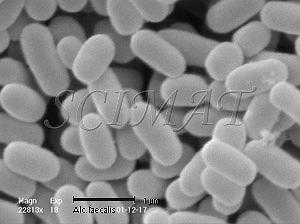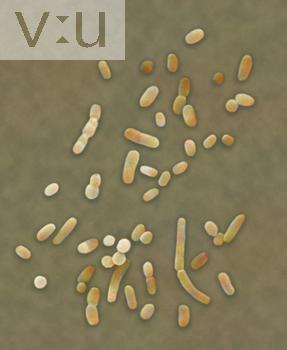Alcaligenes: Difference between revisions
Slonczewski (talk | contribs) No edit summary |
Slonczewski (talk | contribs) No edit summary |
||
| (15 intermediate revisions by 4 users not shown) | |||
| Line 1: | Line 1: | ||
{{Curated}} | |||
{{Biorealm Genus}} | |||
[[Image:Alc2281w.jpg|frame|right|''Alcaligenes faecalis''. Image from [http://anka.livstek.lth.se:2080/Alcfaec.htm SCIMAT 2001.]]] | |||
<h2>Classification</h2> | <h2>Classification</h2> | ||
<h3>Higher order taxa:</h3> | <h3>Higher order taxa:</h3> | ||
Bacteria; Proteobacteria; Betaproteobacteria; Burkholderiales; Alcaligenaceae<br /> | Bacteria; Proteobacteria; Betaproteobacteria; Burkholderiales; Alcaligenaceae<br /> | ||
<h3>Species:</h3> | <h3>Species:</h3> | ||
''Alcaligenes faecalis''<br />''Alcaligenes latus''<br />''Alcaligenes eutrophus''<br />''Alcaligenes viscolactis''<br />''Alcaligenes xylosoxidans'' | |||
''Alcaligenes'' is a genus of Gram-negative, pathogenic, opportunistic bacteria. ''Alcaligenes xylosoxidans '' has been found in the respiratory tracts of cystic fibrosis patients. Because species of this genus are often incorrectly identified, problems linked to cystic fibrosis are difficult to study and rectify. Isolates of this genus have been found in soil or water. ''Alcaligenes faecalis'' is significant because it converts the most | |||
{| | |||
| height="10" bgcolor="#FFDF95" | | |||
'''NCBI: [http://www.ncbi.nlm.nih.gov/Taxonomy/Browser/wwwtax.cgi?mode=Info&id=507&lvl=3&lin=f&keep=1&srchmode=1&unlock Taxonomy] Genome''' | |||
|} | |||
<h2>Description and Significance</h2> | |||
''Alcaligenes'' is a genus of Gram-negative, pathogenic, opportunistic bacteria. ''Alcaligenes xylosoxidans '' has been found in the respiratory tracts of cystic fibrosis patients. Because species of this genus are often incorrectly identified, problems linked to cystic fibrosis are difficult to study and rectify. Isolates of this genus have been found in soil or water. ''Alcaligenes faecalis'' is significant because it converts the most toxic form of arsenic, arsenite (AsO<sub>2</sub><sup>-</sup>, oxidation state +3) to its less dangerous form, arsenate (AsO<sub>4</sub><sup>-</sup>, oxidation state +5). <br />'''<br />Genome Structure'''<br />''Alcaligenes'' is of significant concern to the medical industry, and mapping the genome would provide researchers with consistent identification of this bacteria. However, no major organizations have attempted to sequence it as of yet. | |||
<h2>Cell Structure and Metabolism</h2> | <h2>Cell Structure and Metabolism</h2> | ||
[[Image:320223.jpg | [[Image:320223.jpg|frame|left|''Alcaligenes faecalis''.[http://www.nies.go.jp/biology/mcc/strainlist_a.htm#Anabaena <br />]Image from [http://www.visualsunlimited.com/browse/vu320/vu320223.html Visuals Unlimited.]]] | ||
Species of ''Alcaligenes'' generate energy in a number of ways, including arsenite oxidation. Much about these organisms is virtually unknown, and even identifying its species correctly presents challenges. This is of significance because some species of ''Alcaligenes'' are potential causes of chronic pulmonary disease in patients with cystic fibrosis. ''Alcaligenes'' are gram-negative, or proteobacteria, meaning that they have a distinctive cell envelope. To learn more about the cell structure of proteobacteria, click [http://biology.kenyon.edu/Microbial_Biorealm/bacteria/proteobacteria/gramnegative/gramnegative.html here]. | Species of ''Alcaligenes'' generate energy in a number of ways, including arsenite oxidation. Much about these organisms is virtually unknown, and even identifying its species correctly presents challenges. This is of significance because some species of ''Alcaligenes'' are potential causes of chronic pulmonary disease in patients with cystic fibrosis. ''Alcaligenes'' are gram-negative, or proteobacteria, meaning that they have a distinctive cell envelope. To learn more about the cell structure of proteobacteria, click [http://biology.kenyon.edu/Microbial_Biorealm/bacteria/proteobacteria/gramnegative/gramnegative.html here]. | ||
|} | |} | ||
| Line 20: | Line 26: | ||
''Alcaligenes ''are found in various locations, including soil and aquatic environments, where one species, ''Alcaligenes denitrificans'', has been known to inhibit the growth of certain types of algae. They may also be found in the respiratory tracts of cystic fibrosis patients, where they cause clinical symptoms of pulmonary disease. | ''Alcaligenes ''are found in various locations, including soil and aquatic environments, where one species, ''Alcaligenes denitrificans'', has been known to inhibit the growth of certain types of algae. They may also be found in the respiratory tracts of cystic fibrosis patients, where they cause clinical symptoms of pulmonary disease. | ||
<h2>References | <h2>References</h2> | ||
[http://www.edpsciences.org/articles/jp4/abs/2003/05/jp4pr5p049/jp4pr5p049.html Anderson, G.L. et al. Metabolic energy from arsenite oxidation in ''Alcaligenes faecalis''. Abstract. ''Journal de Physique IV'' vol 107 2003. 49.]<br /><br />[http://jcm.asm.org/cgi/content/full/40/4/1210 Liu, Lixia et al. Ribosomal DNA-Directed PCR for Identification of Achromobacter (Alcaligenes) xylosoxidans Recovered from Sputum Samples from Cystic Fibrosis Patients. ''Journal of Clinical Microbiology ''vol 40(4) April 2002. 1210-1213.]<br /><br />[http://www.int-res.com/articles/ame/22/a022p111.pdf Manage, Pathmalal M. et al. Algicidal effect of the bacterium ''Alcaligenes denifitricans'' on Microcystis spp. ''Aquatic Microbial Ecology ''vol 22 September 8 2000. 111-117.]<br /><br />[http://www.pubmedcentral.nih.gov/articlerender.fcgi?artid=88468&tools=bot Saiman, Lisa et al. Identification and Antimicrobial Susceptibility of ''Alacaligenes xylosoxidans'' Isolated from Patients with Cystic Fibrosis. ''Journal of Clinical Microbiology ''vol 39(11). November 2001. 3942-3945.] | [http://www.edpsciences.org/articles/jp4/abs/2003/05/jp4pr5p049/jp4pr5p049.html Anderson, G.L. et al. Metabolic energy from arsenite oxidation in ''Alcaligenes faecalis''. Abstract. ''Journal de Physique IV'' vol 107 2003. 49.]<br /><br />[http://jcm.asm.org/cgi/content/full/40/4/1210 Liu, Lixia et al. Ribosomal DNA-Directed PCR for Identification of Achromobacter (Alcaligenes) xylosoxidans Recovered from Sputum Samples from Cystic Fibrosis Patients. ''Journal of Clinical Microbiology ''vol 40(4) April 2002. 1210-1213.]<br /><br />[http://www.int-res.com/articles/ame/22/a022p111.pdf Manage, Pathmalal M. et al. Algicidal effect of the bacterium ''Alcaligenes denifitricans'' on Microcystis spp. ''Aquatic Microbial Ecology ''vol 22 September 8 2000. 111-117.]<br /><br />[http://www.pubmedcentral.nih.gov/articlerender.fcgi?artid=88468&tools=bot Saiman, Lisa et al. Identification and Antimicrobial Susceptibility of ''Alacaligenes xylosoxidans'' Isolated from Patients with Cystic Fibrosis. ''Journal of Clinical Microbiology ''vol 39(11). November 2001. 3942-3945.] | ||
< | <!-- Do not edit or remove this line-->[[Category:Pages edited by students of Mary Glogowski at Loyola University]] | ||
Latest revision as of 19:06, 15 June 2011
A Microbial Biorealm page on the genus Alcaligenes

Classification
Higher order taxa:
Bacteria; Proteobacteria; Betaproteobacteria; Burkholderiales; Alcaligenaceae
Species:
Alcaligenes faecalis
Alcaligenes latus
Alcaligenes eutrophus
Alcaligenes viscolactis
Alcaligenes xylosoxidans
|
NCBI: Taxonomy Genome |
Description and Significance
Alcaligenes is a genus of Gram-negative, pathogenic, opportunistic bacteria. Alcaligenes xylosoxidans has been found in the respiratory tracts of cystic fibrosis patients. Because species of this genus are often incorrectly identified, problems linked to cystic fibrosis are difficult to study and rectify. Isolates of this genus have been found in soil or water. Alcaligenes faecalis is significant because it converts the most toxic form of arsenic, arsenite (AsO2-, oxidation state +3) to its less dangerous form, arsenate (AsO4-, oxidation state +5).
Genome Structure
Alcaligenes is of significant concern to the medical industry, and mapping the genome would provide researchers with consistent identification of this bacteria. However, no major organizations have attempted to sequence it as of yet.
Cell Structure and Metabolism

Image from Visuals Unlimited.
Species of Alcaligenes generate energy in a number of ways, including arsenite oxidation. Much about these organisms is virtually unknown, and even identifying its species correctly presents challenges. This is of significance because some species of Alcaligenes are potential causes of chronic pulmonary disease in patients with cystic fibrosis. Alcaligenes are gram-negative, or proteobacteria, meaning that they have a distinctive cell envelope. To learn more about the cell structure of proteobacteria, click here. |}
Ecology
Alcaligenes are found in various locations, including soil and aquatic environments, where one species, Alcaligenes denitrificans, has been known to inhibit the growth of certain types of algae. They may also be found in the respiratory tracts of cystic fibrosis patients, where they cause clinical symptoms of pulmonary disease.
References
Anderson, G.L. et al. Metabolic energy from arsenite oxidation in Alcaligenes faecalis. Abstract. Journal de Physique IV vol 107 2003. 49.
Liu, Lixia et al. Ribosomal DNA-Directed PCR for Identification of Achromobacter (Alcaligenes) xylosoxidans Recovered from Sputum Samples from Cystic Fibrosis Patients. Journal of Clinical Microbiology vol 40(4) April 2002. 1210-1213.
Manage, Pathmalal M. et al. Algicidal effect of the bacterium Alcaligenes denifitricans on Microcystis spp. Aquatic Microbial Ecology vol 22 September 8 2000. 111-117.
Saiman, Lisa et al. Identification and Antimicrobial Susceptibility of Alacaligenes xylosoxidans Isolated from Patients with Cystic Fibrosis. Journal of Clinical Microbiology vol 39(11). November 2001. 3942-3945.
